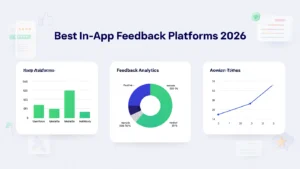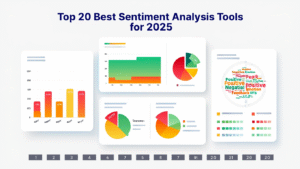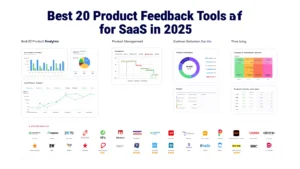The UK events sector has grown into a £42 billion industry, spanning conferences, exhibitions, festivals, and corporate gatherings. According to the UK Events Report , over 1.3 million business events were hosted across the country in the past year, bringing in more than 85 million attendees. Hybrid and in-person formats are both on the rise, with in-person events rebounding strongly after 2022 and drawing in 15% higher attendance in 2023 compared to 2019 levels.
At the same time, engagement has emerged as the defining measure of event success. Studies from Eventbrite and BVEP indicate that 74% of UK event organisers now rank attendee engagement as their top priority, surpassing traditional goals such as lead generation or ticket sales. Whether measured by networking participation, session attendance, or digital interaction, engagement data increasingly shapes how organisers plan and measure their events.
Understanding Event Attendee Engagement Statistics
Engagement statistics are not just abstract numbers; they define the return on investment for attendees and organisers alike. A 2023 report from Freeman highlighted that 77% of UK attendees are more likely to return to an event if they felt actively engaged, underscoring the financial importance of creating participation-driven environments.
Reliable engagement data comes from:
- Government and trade reports (UK Events Report, DCMS statistics, VisitBritain data).
- Industry studies from groups such as BVEP, Eventbrite, and Freeman.
- Surveys of attendees and organisers, often published annually by large venue operators or trade associations.
These reports typically measure:
- Attendance rates and session participation.
- Networking activity (digital matchmaking, in-person meetups).
- Social media mentions and online reach during the event.
- Post-event surveys on satisfaction and likelihood of return.
Trends in Event Attendee Engagement in the UK

In-Person Events Driving Stronger Connections
UK in-person events have staged a strong rebound. According to VisitBritain , 70% of attendees at business events in the UK stated face-to-face interaction was their primary reason for attending, up from 61% in 2021. This resurgence reflects a renewed appetite for networking and relationship-building after the pandemic. Attendance growth has been strongest in London, Birmingham, and Manchester, where international connectivity adds further value for business delegates.
Digital and Hybrid Engagement Patterns
Hybrid events remain popular, but the engagement split is clear. A 2023 Eventbrite survey reported that 65% of UK attendees attending virtually engaged less than half the time compared with their in-person counterparts. However, hybrid formats continue to attract 25–30% higher overall registrations, particularly for events with international reach. Digital Q&A tools, polls, and live chat were cited as the most effective features for keeping virtual participants active.
- Top Hybrid Engagement Features:
- 54% participation in live polls
- 47% use of chat/Q&A functions
- 31% engagement with networking apps
- 54% participation in live polls
Shifts in Session Attendance and Breakout Participation
Another noticeable trend is the shift in session dynamics. Data from BVEP found that smaller breakout sessions saw engagement levels 40% higher than large plenary sessions. Attendees reported that interactive formats — workshops, roundtables, and panel discussions — felt more valuable compared with traditional keynote sessions.
Engagement by Session Type
| Session Type | Avg. Engagement Score |
| Breakout/Workshops | 82% |
| Panel Discussions | 74% |
| Keynote Sessions | 58% |
Regional Observations in the UK
- London: Highest international engagement, with over 40% of attendees from outside the UK at major conferences.
- Manchester: Strong student and young professional turnout, with 32% of attendees under 30.
- Birmingham: Hybrid-focused, with 48% of events offering a digital attendance option in 2023.
Measuring Attendee Engagement at UK Events

Core Metrics for Engagement
Engagement is no longer measured purely by attendance. UK organisers increasingly use a combination of quantitative and qualitative indicators:
- Session participation – Average attendance rates within sessions.
- Networking activity – Number of meetings booked, app logins, or badge scans.
- Digital interaction – Social media posts, hashtags, and live-stream engagement.
- Post-event surveys – Ratings of speaker quality, content relevance, and overall satisfaction.
According to a 2023 Freeman study, 68% of UK organisers now use at least four separate metrics to assess attendee engagement, up from 52% in 2021.
The Role of Technology in Tracking
Technology is central to measuring engagement. RFID badges, mobile event apps, and QR-based entry systems are widely adopted. A 2023 report from Cvent showed that 72% of UK event organisers use mobile apps to track engagement, while 61% rely on real-time polling platforms.
- Popular UK Event Tech Tools for Engagement Tracking:
- RFID-enabled badge scanning (55%)
- Mobile event apps (72%)
- Polling/Q&A platforms (61%)
- Networking matchmaking software (49%)
- RFID-enabled badge scanning (55%)
Post-Event Feedback as a Benchmark
Post-event surveys continue to be the most consistent benchmark. A VisitBritain report noted that 82% of attendees complete digital feedback forms when prompted within 24 hours, compared with just 46% when contacted three days later.
Survey results also highlight trends in attendee expectations:
- 76% want events to provide more interactive elements.
- 64% prefer mobile-based resources over printed materials.
- 58% expect hybrid or digital access, even for primarily in-person events.
Linking Engagement to ROI
Organisers now use engagement metrics as a proxy for financial performance. BVEP found that events with higher engagement scores reported a 22% stronger return on sponsorship investment compared to low-engagement events. This shift signals that engagement is no longer a secondary measurement — it is directly tied to profitability and long-term success.
The Impact of Technology on UK Event Attendee Engagement

Mobile Apps as Engagement Hubs
Event apps have become the primary touchpoint for UK attendees. According to Cvent’s 2023 UK Event Trends report, 72% of delegates used an official event app during conferences, with the most frequent interactions being:
- Building personalised agendas (63%)
- Booking meetings with other attendees (57%)
- Participating in polls and surveys (49%)
Apps are not only tools for convenience but also critical for tracking behavioural data, which organisers use to refine event design.
Gamification and Interactive Features
Gamification has steadily gained traction, particularly at trade shows and youth-focused events. Freeman reported that 41% of UK event organisers implemented gamification techniques, such as leaderboard challenges, scavenger hunts, and reward-based participation. These approaches increased session attendance by an average of 19% compared with non-gamified events.
Interactive elements are also reshaping expectations:
- Live polling and Q&A: Used by 61% of UK organisers.
- AR/VR demonstrations: Featured in 23% of exhibitions, particularly in technology and automotive sectors.
- Digital matchmaking tools: Adopted at 49% of major UK trade shows.
Social Media as a Real-Time Engagement Channel
Social platforms remain a parallel engagement layer. In 2023, Eventbrite noted that 78% of UK attendees posted at least once about an event they attended, with hashtags averaging 2.1 million impressions for large-scale conferences. Twitter/X and LinkedIn dominate for professional events, while Instagram and TikTok are prevalent at festivals and consumer-facing exhibitions.
Case of Hybrid Integration
Hybrid technologies continue to shape engagement in the UK, but their usage has evolved. Whereas 2021–22 saw hybrid primarily as a pandemic-driven necessity, 2023 data from BVEP shows that 48% of organisers now use hybrid formats strategically to expand reach. Yet, challenges remain: online attendees average 40% less interaction time compared with in-person participants. To counter this, organisers are embedding dedicated moderators, breakout chat groups, and “digital-only” sessions designed to raise virtual engagement levels.
Behavioural Patterns of UK Event Attendees

Preferences for Interactive Formats
UK attendees are showing a marked preference for participatory experiences over passive consumption. According to BVEP , 74% of attendees stated they valued events with workshops and small-group activities more than keynote-heavy formats. This has pushed organisers to redesign agendas, offering shorter lectures paired with interactive sessions.
Key observations:
- Workshops and roundtables: 40% higher participation compared with standard lectures.
- Networking lounges: Engagement rates up by 27% since 2022.
- Panel sessions: 66% of attendees report feeling “more connected” after panel discussions compared with solo presentations.
Generational Differences in Engagement
Event behaviour varies considerably by age group in the UK. A 2023 VisitBritain report highlighted distinct generational trends:
- Gen Z (18–24): Prioritise social media interaction, with 81% posting about events live and 65% preferring gamified features.
- Millennials (25–40): Seek networking value; 71% reported apps with matchmaking features improved their event experience.
- Gen X & Boomers (40+): Value content-rich sessions; 68% reported speaker quality as their main engagement driver.
Regional Attendance Patterns
Regional differences also influence behaviour:
- London: Attendees typically spend longer per session — average of 62 minutes compared with 48 minutes nationwide.
- Scotland (Edinburgh & Glasgow): Higher adoption of hybrid events, with 52% joining digitally when travel is a barrier.
- North of England: Strong demand for informal networking; 33% more likely to attend social mixers compared with southern counterparts.
Attention Span and Session Design
Attention span is another measurable behaviour shaping UK event planning. Freeman’s 2023 study found that average attendee focus lasts 29 minutes during a standard presentation, prompting organisers to shorten sessions and introduce interactive checkpoints. The shift is particularly notable at corporate conferences, where long-form lectures have steadily declined in favour of segmented content delivery.
Networking and Community-Building Trends in UK Events
The Central Role of Networking
Networking remains the number one engagement driver for UK business event attendees. According to the Meetings Industry Association , 82% of delegates ranked networking opportunities as the most valuable aspect of attending an event. In fact, networking scored higher than educational sessions, exhibitor interactions, or keynote speeches.
Key data points from 2023:
- 67% of attendees reported that they made new professional contacts at their last event.
- 42% secured at least one business lead through networking activities.
- 38% of attendees stated they attend primarily for networking, not content.
Digital Networking Tools
Mobile networking tools are shaping how connections are made. Event apps now offer matchmaking features, private messaging, and AI-based recommendations. A Freeman survey found that 71% of UK attendees using an event app reported making more connections compared with traditional networking.
Most-used networking features in UK events:
- Meeting request systems (59%)
- AI-recommended connections (46%)
- QR-code-enabled contact exchange (52%)
Informal and Social Networking Spaces
UK attendees increasingly prefer informal environments to structured networking sessions. A VisitBritain study showed that 59% of delegates favoured networking lounges, cafés, or evening receptions over scheduled “speed networking” formats. This trend is particularly strong in creative and technology sectors, where relaxed settings foster more natural interactions.
Regional Networking Culture
- London & Birmingham: High proportion of structured corporate networking, with strong exhibitor-led formats.
- Manchester & Leeds: Higher uptake of informal mixers, often combined with local cultural activities.
- Scotland (Edinburgh & Glasgow): Networking blended with tourism experiences, with 34% of international delegates extending their stay for leisure.
Long-Term Community Building
Events are no longer isolated encounters but part of continuous professional communities. According to BVEP , 61% of UK attendees joined online groups or forums linked to the event after attending, indicating that community-building extends beyond the event itself. LinkedIn groups and event-specific Slack channels are two of the most common tools for sustaining post-event engagement.
Sponsorship Value and Engagement Statistics in UK Events
Sponsorship as an Engagement Catalyst
Sponsorship has evolved from static branding to active participation. A BVEP report revealed that 72% of UK attendees engage more with events when sponsors provide interactive activations, such as demo zones, gamified challenges, or hosted networking sessions. Static logo placements, by contrast, were rated as “forgettable” by over half of respondents.
Key sponsor-driven engagement formats in 2023:
- Interactive product demos (48%)
- Sponsored networking lounges (41%)
- Gamified prize draws (37%)
- Mobile app sponsorships (33%)
Measuring Sponsor ROI Through Engagement
Sponsors are now looking beyond foot traffic and leads; they are assessing engagement impact. Freeman’s 2023 UK event survey showed that sponsored activations generated a 27% longer dwell time compared with standard exhibitor booths. In addition, 61% of attendees stated they were more likely to remember a sponsor that provided an interactive experience.
Average ROI indicators from UK events :
| Engagement Metric | Impact on Sponsorship ROI |
| Dwell time at booths | +27% increase |
| App interactions with sponsor | +19% engagement lift |
| Sponsored session attendance | +23% more attendee recall |
Sponsorship Engagement by Sector
Sponsorship effectiveness varies by industry:
- Technology: High engagement from demo zones and AR/VR experiences, with 68% of attendees interacting directly with tech sponsors.
- Healthcare & Pharma: Stronger impact from sponsored workshops and training sessions, driving 45% higher attendance rates.
- Hospitality & Travel: Popular for networking-based activations, where 54% of attendees engaged in sponsored receptions.
UK Regional Sponsorship Patterns
- London: Premium sponsorships dominate, with high-cost activations linked to international reach.
- Manchester: Mid-sized activations, especially in creative industries, are driving strong audience interaction.
- Scotland: Tourism-linked sponsorships are most effective, as 31% of delegates combine business with leisure travel.
Sponsors increasingly judge success on quality of engagement rather than volume of impressions. With engagement linked to ROI, sponsorship strategies are aligning more closely with attendee experience.
The Role of Sustainability and Ethical Engagement in UK Events
Growing Attendee Demand for Sustainable Practices
Sustainability has shifted from a “nice-to-have” to a major engagement driver. According to a 2023 Eventbrite UK study, 68% of attendees stated that they are more engaged when an event demonstrates clear sustainability measures, such as reducing single-use plastics or offering plant-based catering options. Among younger attendees (18–34), this figure rises to 77%.
Key sustainable engagement features at UK events in 2023:
- Digital ticketing (adopted by 84% of events)
- Recyclable or reusable materials (62%)
- Carbon offsetting options for delegates (41%)
- Sustainable catering (49%)
Ethical Sponsorship and Transparency
Attendees are increasingly aware of who funds and sponsors events. Freeman’s 2023 report found that 57% of UK attendees said they would disengage from an event if sponsors were misaligned with their values, particularly in areas like environmental responsibility or labour practices. Conversely, 46% reported higher engagement when sponsors supported ethical initiatives such as community projects or green charities.
Regional Variations in Sustainability Engagement
- London: Strongest adoption of carbon reduction practices, with 38% of conferences tracking and reporting emissions.
- Manchester: Leading in plant-based catering, with 52% of events offering 50% or more vegan/vegetarian menus.
- Scotland: Popular for hybrid event participation, reducing delegate travel impact; 47% of events provided digital attendance as a sustainability measure.
Accessibility as Part of Ethical Engagement
Ethics extends beyond sustainability into inclusivity. The Meetings Industry Association reported that 61% of UK attendees with accessibility needs said their engagement increased when events provided clear accommodations such as captioned live streams, mobility-friendly venues, and quiet zones.
This shift shows that sustainability and ethics are not just compliance topics; they are directly tied to attendee satisfaction and engagement. Events that align with these values tend to foster stronger loyalty and repeat attendance.
Future Outlook for Event Attendee Engagement in the UK
Continued Growth of Hybrid and Digital Layers
Hybrid formats are expected to remain a permanent fixture. According to VisitBritain projections (2024), 49% of UK business events are expected to retain hybrid elements by 2025, even as in-person attendance strengthens. These hybrid layers are no longer just live-streams but include on-demand content, digital networking, and app-based resource libraries. This ensures that engagement extends well beyond the event itself.
Data-Driven Personalisation of Experiences
Organisers are investing heavily in personalised attendee journeys. Cvent’s 2023 UK Event Trends survey revealed that 64% of organisers are using behavioural data to tailor recommendations within apps and platforms. By 2025, the number is expected to rise above 75%. Personalisation increases the likelihood of repeat attendance — 71% of delegates said they are more likely to return when an event feels customised to their interests.
The Role of AI and Automation
Artificial intelligence is set to reshape engagement touchpoints. Early adoption in UK events includes:
- AI-powered matchmaking for networking (currently 46% adoption, projected to exceed 60% by 2025).
- Automated translation and captioning tools for accessibility.
- Predictive analytics to identify disengaged attendees in real time.
Freeman forecasts that AI-enabled engagement tracking could cut attendee churn by 15% in recurring annual events.
Generational Shifts Shaping Engagement
The demographic profile of attendees is also changing. By 2026, Gen Z will make up an estimated 30% of UK business event participants (BVEP, 2023). This group expects gamification, social media integration, and ethical values as part of their event experience. Organisers who fail to adapt risk alienating a growing share of the market.
UK Cities Preparing for the Future
- London: Investing in smart venues equipped with advanced digital infrastructure.
- Manchester: Strengthening its reputation for hybrid-first events.
- Edinburgh & Glasgow: Leveraging sustainability credentials to attract global delegates.
The outlook is clear: engagement will not just measure satisfaction, it will determine the long-term survival and competitiveness of UK events.
Key Takeaways on Event Attendee Engagement Statistics in the UK
Event attendee engagement in the UK has moved from being a secondary metric to the core measure of event success. The statistics from the past two years show a sector reshaped by digital innovation, sustainability expectations, and the rising influence of younger attendees.
Key takeaways from the data presented throughout this blog:
- In-person resurgence: Business events and festivals across the UK saw strong recovery, with attendance in 2023 exceeding 2019 levels by 15%.
- Hybrid permanence: Around 49% of UK events are expected to retain hybrid features by 2025, not as a replacement but as an expansion of reach.
- Technology-driven engagement: Event apps are used by 72% of organisers, while gamification and AR/VR are driving higher session participation.
- Networking remains king: 82% of attendees ranked networking as their primary motivation for attending events, supported by mobile-based matchmaking.
- Sustainability as an engagement driver: 68% of attendees reported stronger engagement when events adopted visible sustainability measures.
- Sponsorship alignment: Interactive sponsor activations increased dwell time by 27% compared with traditional branding.
- Generational influence: Gen Z is shaping future expectations, with 81% posting about events on social media and seeking gamified, digital-first experiences.
The UK event sector is in a strong position globally, thanks to its ability to combine historic venues, international connectivity, and a willingness to adapt quickly. Engagement statistics clearly demonstrate that attendee expectations are shifting — events are no longer just about content delivery, but about interactive, inclusive, and ethically aligned experiences.
As UK events continue to grow, these statistics will remain essential for researchers, planners, and sponsors who want to benchmark performance and design experiences that resonate with evolving attendee behaviour.
Why Choose Pearl Lemon Experiences for Event Attendee Engagement in the UK
Event attendee engagement is more than just a number — it’s the foundation of event success. At Pearl Lemon Experiences, we specialise in creating experiences that keep attendees involved from start to finish, ensuring that your event delivers both immediate impact and lasting connections.
What Sets Us Apart
- UK-focused expertise: From London to Manchester, Birmingham to Edinburgh, we design experiences tailored to local audiences while attracting international participants.
- Technology-driven solutions: We integrate event apps, live polling, gamification, and hybrid tools to track and grow engagement effectively.
- Networking excellence: Whether through informal lounges or structured matchmaking, we build opportunities for meaningful professional connections.
- Commitment to sustainability: Our team incorporates ethical and sustainable practices, aligning with attendee expectations and boosting loyalty.
- Proven engagement outcomes: Our approach has helped organisers achieve higher participation rates, stronger sponsor ROI, and repeat attendance.
With Pearl Lemon Experiences, engagement is not left to chance. Every event we deliver is carefully designed to ensure attendees feel connected, involved, and eager to return.
FAQs
1. How does Pearl Lemon Experiences use event attendee engagement statistics?
We analyse event attendee engagement statistics to identify what keeps audiences active and connected. This helps us design events that maximise participation and create meaningful experiences.
2. Can Pearl Lemon Experiences improve attendee engagement at corporate events?
Yes — we specialise in corporate event engagement across the UK. From conferences in London to trade shows in Birmingham, our team uses live polls, gamification, and networking lounges to improve participation levels.
3. Do you provide hybrid event engagement solutions in the UK?
Absolutely. We integrate digital platforms with in-person experiences, ensuring both audiences are engaged. Our hybrid strategies often lead to 25–30% higher attendance figures, supported by tailored engagement features.
4. What role do you play in measuring attendee engagement?
We track event attendee engagement statistics through apps, surveys, and networking tools. This allows organisers to see clear performance data, including session attendance rates, interaction levels, and sponsor ROI.
5. How can Pearl Lemon Experiences help with networking engagement?
We design structured and informal networking opportunities. Using event apps and AI-powered matchmaking, we ensure attendees leave with valuable new connections — a top priority for 82% of UK delegates.
6. Do you provide sustainable engagement solutions?
Yes — we integrate sustainability into engagement strategies. Whether it’s digital ticketing, eco-friendly catering, or hybrid participation, we ensure engagement aligns with attendee expectations for ethical practices.
7. How do you support sponsors with engagement?
We help sponsors achieve measurable ROI by designing interactive activations. Engagement statistics show that dwell time increases by 27% when sponsors provide interactive experiences, and we ensure those opportunities are built into every event.
8. Which UK cities do you cover for event engagement services?
We provide services across the UK, including London, Manchester, Birmingham, Edinburgh, and Glasgow. Each location has unique attendee engagement trends, and we tailor our approach accordingly.
9. Can Pearl Lemon Experiences personalise engagement strategies for different audiences?
Yes — we use behavioural insights and attendee statistics to shape personalised experiences. Whether catering to Gen Z, Millennials, or senior professionals, we adapt engagement tools to audience needs.
10. Why should organisers choose Pearl Lemon Experiences for engagement solutions?
Because we combine UK-specific expertise, technology integration, and proven engagement outcomes. Our approach ensures attendees stay active, sponsors see results, and organisers have clear engagement statistics to guide future planning.





